Rule of Law Forum Panel, Turkiye 2023
Tuesday 16 January 2024
Session one: economics and the rule of law
Chair:
Dr Emin Karagözoğlu, Associate Professor, Bilkent University, Ankara
Speakers:
Dr Giulia Gentile, Assistant Professor, University of Essex, Essex
Dr Arda Gitmez, Assistant Professor, Bilkent University, Ankara
Session two: political science and the rule of law
Chair:
Dr Ece Göztepe, Professor, Bilkent University, Ankara
Speakers:
Dr Lydia Tiese, Professor, University of Houston, Houston, Texas
Dr Ersin Kalaycıoğlu, Professor, Sabancı University, Istanbul
Dr Meral Uğur Çınar, Assistant Professor, Bilkent University, Ankara
Opening speech – Prof Dr Ece Göztepe
Dr Göztepe, dean of Bilkent University Faculty of Law, welcomed the guests with an intriguing opening speech on the concept of the rule of law, its connection with democracy, and its implementation in Türkiye. She emphasised that, despite it being a concept frequently used by all modern states and international organisations in several documents, it has yet to acquire a uniform meaning and content. The concept was developed by the states of the 18th century, but, of course, within their own political and historical context. Accordingly, some legal systems focus on procedural aspects such as the right to a fair trial, the legality of administrative acts and judicial review of public actions, while others are more concerned with material guarantees like habeas corpus, political participation rights and protection of basic human rights against public intervention.
Through the end of the 1990s, explained Dr Göztepe, international organisations worked out checklists for the purpose of collecting all aspects of the rule of law principle, on which the modern constitutional states should base their constitutional order. These also included many subtitles to concretise these aspects. Following some examples of these, Dr Göz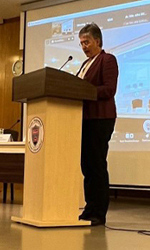 tepe continued with remarks on the tension between the rule of law and democracy. This basically derives from the fact that the rule of law serves to restrict the elected political will as well. There are also indexes measuring the fulfilment of the rule of law requirements in connection with democracy, such as World Justice Project, V-Dem and Freedom House. According to said indexes, unfortunately, Türkiye does not pass with flying colours. Quite the contrary, Türkiye is classified as ‘not free’ in the Freedom House index, dropping back 31 stages in the last 10 years. The results of other indexes are also parallel.
tepe continued with remarks on the tension between the rule of law and democracy. This basically derives from the fact that the rule of law serves to restrict the elected political will as well. There are also indexes measuring the fulfilment of the rule of law requirements in connection with democracy, such as World Justice Project, V-Dem and Freedom House. According to said indexes, unfortunately, Türkiye does not pass with flying colours. Quite the contrary, Türkiye is classified as ‘not free’ in the Freedom House index, dropping back 31 stages in the last 10 years. The results of other indexes are also parallel.
So, the overall ranking does not give Türkiye a prestigious place in the implementation of the rule of law principle. This is not only a judicial issue, concluded Dr Göztepe, it also affects all societal branches; including but not limited to the economy, education and health. At this point, reference was made to Niklas Luhmann’s system theory, to which, according to Dr Göztepe, the tension between the rule of law and democracy constitutes an ideal example by showing that none of the systemic parts of a society can be isolated from another. The collapse of one cannot remain without influence on the others. This panel was very much held with the aim of gaining a deeper insight into these connections and inspiring discussions on the issue.
Session one: economics and the rule of law session
Opening remarks – Assoc Prof Dr Emin Karagözoğlu
Dr Karagözoğlu opened the session with the following striking remark ‘Law and economics: a couple not to be decoupled’. He explained the importance of defining the environment and the ‘rules of the game’ in economic models, and that the same is true for the legal framework. Economic agents prefer to have a complete information of the conditions under which they operate and as such they dislike uncertainty. Law, continued Dr Karagözoğlu, tackles uncertainty through rules and regulations.
Many empirical studies show that better legal systems and more predictability leads to better financial institutions and a higher growth rate. However, this influence is not one-sided. Economics also affects law, as it is natural for the legal framework to be concerned about economic efficiency and justice. So, input from economics is valuable for legal scholars and law is, and should be, concerned with economic institutions. Dr Karagözoğlu highlighted the need for a strengthened collaboration between law and economics disciplines, especially in coming up with up-to-date definitions in the face of rapid changes in artificial intelligence, machine learning and data science. He gave examples from the works of prominent economic theorists that demonstrate the importance of having an economic perspective to legal problems in order to determine the ideal rules.
From value to hard (rule of) law: the Council of Europe and the EU – Asst Prof Dr Giulia Gentile
In her presentation, Dr Gentile argued that rule of law is not any longer an abstract value or ideology; rather, it has become ‘hard law’ in the Council of Europe and the EU. In other words, this value has acquired clear normative content and legal bite, by imposing defined obligations on public bodies. Dr Gentile started her presentation by reminding attendees that the rule of law is a broadly discussed ideal. It was defined as a ‘principle’, as an ‘orthodoxy’ or even as something that is ‘good for everyone’. Dr Gentile introduced different rule of law theories, which can be divided into either formal or substantive. Formal conceptions of the rule of law focus on the ordering function of the law and accentuate the value of procedure in governing society. The substantive versions of rule of law, instead, focus on individual and collective rights and the effective protection thereof. According to Dr Gentile, irrespective of the existence of different theories, there are three recurring themes regarding the rule of law: limitation of the government by law, formal legality (the idea that law applies equally to everyone) and law’s sovereignty instead of men.
Subsequently, Dr Gentile illustrated the transformation of the rule of law into hard law through the analysis of various judicial decisions and legal measures adopted in the Council of Europe and the EU. In light of the examined case law and instruments, as observed by Dr Gentile, the rule of law currently requires compliance with very specific obligations from public authorities to ensure good governance. As a result, the rule of law is no longer an abstract value or ideology, but a legal principle both in the Council of Europe and the EU.
Dr Gentile also raised several questions and perils associated with this transformation. Among these, Dr Gentile emphasised that in the Council of Europe and the EU, where there are multiple levels of governance and different legal orders, there is a continuous risk of abuse of the rule of law principle. The causes of this risk lie in the constitutional pluralism that permeates Europe and the advancement of authoritarian regimes, leading to contestation of the European versions of the rule of law and, ultimately, to resistance against complia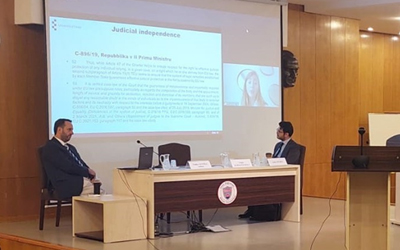 nce with its requirements.
nce with its requirements.
In the Q&A phase, it was questioned whether a right balance could be found between respect of the rule of law and pluralism. Dr Gentile responded that, notwithstanding the importance of constitutional plural- ism in the EU, the essential tenets of the rule of law as defined at the EU and Council of Europe levels should not be undermined. Another question concerned whether the EU effectively deals with issues caused by recently admitted EU countries’ poor performances in reaching the EU legal standards. Dr Gentile explained that under the EU treaties there are mechanisms for imposing sanctions against member states that do not conform with the rule of law’s requirements. But such sanctions may only be imposed through a unanimous vote of the European Council. Therefore, political and legal problems are intertwined, with politics dominating over the law of the EU. Nevertheless, somewhat more successful in sanctioning rule of law violations have been the EU secondary measures making EU funds dependent on compliance with the rule of law.
On institutions and the role of law – Asst Prof Dr Arda Gitmez
‘What is an optimal policy?’ is one of the questions that economists strive to answer. But is finding the optimal sufficient? Dr Gitmez argues otherwise and claims that being able to implement and enforce a policy is just as important for reaching better economic outcomes. So, it’s not enough to write the optimal contract; there should be the right environment and tools to implement it. The tools that let us enforce the contracts are called ‘institutions’, which are, Dr Gitmez explains, difficult to define, but could be discerned when seen. These consist of informal constraints such as sanctions, taboos, customs, traditions and codes of conduct (‘informal institutions’), and formal rules such as the constitution and other laws (‘formal institutions’). It is acknowledged that these institutions affect behaviors and vice versa. This means that both formal and informal institutions have an impact on economic outcomes. But as per Dr Gitmez’s findings and examples, formal and informal institutions also affect one another.
In this complex scheme, in Dr Gitmez’s point of view, it is known that institutions matter, but a clear answer on how good they can be designed cannot be given. At least it is sure that, according to Dr Gitmez, in order to set up good institutions, formal institutions (laws) should be complemented by the right type of informal institutions (civil society, trust, codes of conduct, independent media etc.) and vice versa. The question of how (broadly) the concept of rule of law should be defined is also crucial in this context. In light of these explanations, Dr Gitmez concluded his presentation with the question ‘how broad should we be in defining the rule of law?’ Should informal institutions be included or not? Dr Gitmez argues in favour of a broader definition, but even if a narrow definition is adopt- ed, the concept of rule of law would still have overarching consequences on economic outcomes, current institutions, future institutions, political stability and social fabric.
In the Q&A session, Dr Gitmez was asked about an example in his presentation on the perception of state and leaders in the Islamic world. In particular, the question concerned why Islamic scholars were contemplating overthrowing leaders rather than limiting their power. Dr Gitmez explained that in Islamic states there is Sharia, which is very encompassing in its natur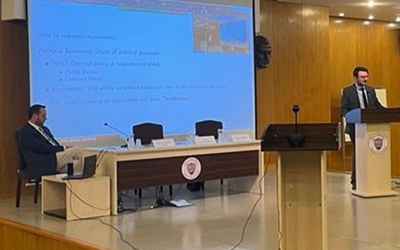 e. This primes scholars into thinking that the state is not an apparatus for legislation, but only for the execution of Sharia. Since the legislation is already in place due to Sharia, people did not come together to discuss legislative policy and they thought that the reason for the existence of state is merely Sharia’s execution. Therefore, limitation of leaders’ powers by means of law was glossed over. Another question concerned why economists have been emphasising the institutions as merely constraining factors, even though sometimes they constitute enabling factors. Dr Gitmez admitted that there is no precise answer as to why this literature goes in this direction. But logically, almost by definition, an institution that constrains one party, liberates the other. So, from a certain perspective, a constraining institution for one part of society is almost always a liberating factor for another part of society.
e. This primes scholars into thinking that the state is not an apparatus for legislation, but only for the execution of Sharia. Since the legislation is already in place due to Sharia, people did not come together to discuss legislative policy and they thought that the reason for the existence of state is merely Sharia’s execution. Therefore, limitation of leaders’ powers by means of law was glossed over. Another question concerned why economists have been emphasising the institutions as merely constraining factors, even though sometimes they constitute enabling factors. Dr Gitmez admitted that there is no precise answer as to why this literature goes in this direction. But logically, almost by definition, an institution that constrains one party, liberates the other. So, from a certain perspective, a constraining institution for one part of society is almost always a liberating factor for another part of society.
Session two: political science and the rule of law
Political Science and the rule of law – Prof Lydia Tiede
Dr Tiede’s presentation focused on the definition of rule of law as well as current implications and questions thereof in the political science area of academia. Disagreeing with the concept’s procedural definitions, Dr Tiede considers the substantive elements. According to her, this is a multifaceted concept with five dimensions, but countries and individuals choose which facets to emphasise and each facet itself may be understood on a continuum. These five facets are as follows: security of property; security of person; respect for human rights; (absence of significant) corruption; and limits on the executive (institutional checks and balances). Following explanations on the content of these facets, Dr Tiede mentioned determinants of democratic backsliding, which consist of polarisation, rise of populism and collapse of aspects of rule of law that can be observed through attacks on legal institutions, lack of constraints on the executive and manipulatable legislature. Dr Tiede also touched upon the requirements for establishing rule of law after transitions, civil war and democratic backsliding. According to her, two aspects are crucial. First, a certain level of economic development is required.
In addition, internal debates about the meaning of rule of law are also needed to decide which of its facets to emphasise depending on the society. External pressure may also be effective if the country’s stakeholders and external promoters work together. International organisations also have a role in the development of rule of law, especially through international courts and law, conditional memberships, and punishment for not upholding the rule of law standards. In conclusion, Dr Tiede conceded that future research on the area is needed.
In the Q&A session, a question relating to the protection of minority rights was posed. The enquirer explained that according to Hans Kelsen, the majority’s incentive in not restricting the rights of the minority depends on the possibility that the majority may become the minority one day. But according to the enquirer, today, as seen in countries such as Hungary and Poland, the political majority no longer has any incentive not to restrict the minority’s rights. The question is what can be done about this. In response, Dr Tiede explained that people in power need to be concerned that they are going to be out of power one day. Then they should want to have rule of law, which is a system that will also protect them when they are out of power. So, leaders must be incentivised in order for the majority not to restrict the minority’s rights. This may also be done with internal or external pressure. But the individuals must also believe that it is important not to restrict the minority rights.
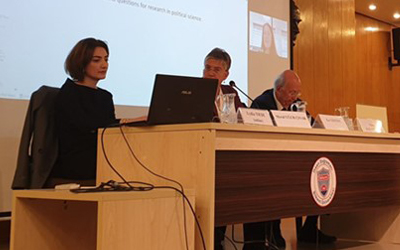
Rule of law, good governance and democracy with special emphasis on Türkiye – Prof Dr Ersin Kalaycıoğlu
Dr Kalaycıoğlu introduced himself as an empiricist and began his presentation with highly accepted, institutional definitions of rule of law. The question is whether one can come up with scientific measure for defining rule of law. Due to the great number of requirements deducted from the ‘universal principles’ referred to in the highly accepted definitions of rule of law, and the uncertainty as to whether there is an importance ranking among these requirements, Dr Kalaycıoğlu concluded that these cannot lead to a rigorous concept for scientific use. But, from the requirements included in these definitions, democracy and rule of law are defined by reference to similar characteristics, such as accountability, and thus such overlaps produce tautological definitions and corrupt rigorous measurement of these two concepts independent of each other. Of course, this conclusion leads to important questions: how do we know whether states are abiding by rule of law and democracy separately? How are states required to regulate the behaviour of their subjects? How do states make binding political decisions in this regard? In examining these questions, Dr Kalaycıoğlu gave many examples, particularly from Organization for Economic Cooperation and Development (OECD) reports on Regulation Impact Analyses (RIA), which demonstrate the importance of informing the public about planned/future laws as well as making ex post impact assessments of newly enacted laws or secondary regulations. In the case of Türkiye, neither of these activities are carried out effectively according to the said OECD reports. So, explained Dr Kalaycoğlu, the Turkish legislature has no idea whether any law it has hitherto enacted actually serves the purpose they were intended for. In this context, criminal law and its application seems to be posing a huge problem, which could also be seen from the number of European Court of Human Rights violation decisions against Türkiye. Dr Kalaycıoğlu concluded his presentation with remarks on rule of law vs democracy. According to his findings, democracy is perceived as either procedurally or substantively by the majority of people in Türkiye. Data show that in western and north- western part of Europe procedural definitions of democracy are popular. These consist of consolidated democracies, where democracy and rule of law mostly overlap.
However, as one gets closer to the eastern part of Europe, substantive definitions, which emphasise patronage activities producing benefits to the citizens in return for votes, irrespective of whether they are within or without the law, are prevalent. These are hybrid regimes, or ‘electoral autocracies’, where democracy is reduced to a practice of populist patronage. According to Dr Kalaycıoğlu, in the case of Türkiye, democracy has functioned at the expense of the rule of law since the 1950s. In Türkiye, people are not demanding rule of law, they do not try to find legal solutions to their legal problems. Instead, they try solving these through other means such as political connections. In Türkiye we are living in a substantive democracy, but not under rule of law. Therefore, in Dr Kalaycıoğlu’s point of view, democracy and rule of law may not be as closely intertwined as one thinks when democracy is understood as substantive democracy.
In the Q&A session, a participant asked whether it would be appropriate to relate rule of law and populism on one hand, and the literature on democracy and authoritarianism on the other. Dr Kalaycıoğlu responded that according to his understanding, rule of law has nothing to do with the substantive understanding of democracy, particularly in the Turkish case. In Dr Kalaycıoğlu’s perspective, as it stands now, populism will not result in any democratic outcomes. It is a threat to democracy; it at least erodes democracy. It paves the way for a more authoritarian regime, and according to Dr Kalaycıoğlu, there is no other possible result or chance. Another question concerned the chance of civil society to reorganise against populism, particularly in Türkiye.
Dr Kalaycıoğlu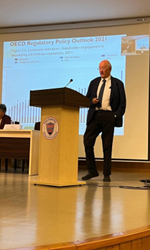 found it unlikely. In his perspective, civil society does not have any chance. Only those who have power can change things around and civil society has none. This is actually where populism feeds from. A separate question was on the compatibility of exercising violence and democracy. Dr Kalaycıoğlu explained that there are certain limits that can be tolerated for the public good. The question is how far you can go before you draw the line. The existence of sanctions that require the use of violence is natural. This exists in democratic environments as well. It is also subject to some kind of judicial review, so it is the judges who must come up with a redline. Therefore, according to Dr Kalaycıoğlu, there is no contradiction between states’ exercise of legitimate violence and democracy. Last but not the least, it was questioned whether some governmental systems are better and effective for securing and sustaining the rule of law, particularly in the Turkish political context. Dr Kalaycıoğlu responded that political scientists abandoned that query a long time ago. He explained that political scientists know in general that the least amount of violence is produced in countries with a regime with working representative parliamentary democracies. But, according to Dr Kalaycıoğlu, in Türkiye we could not do it as it requires another culture. A culture which accepts that the government and the opposition can work together for the good of the people and country.
found it unlikely. In his perspective, civil society does not have any chance. Only those who have power can change things around and civil society has none. This is actually where populism feeds from. A separate question was on the compatibility of exercising violence and democracy. Dr Kalaycıoğlu explained that there are certain limits that can be tolerated for the public good. The question is how far you can go before you draw the line. The existence of sanctions that require the use of violence is natural. This exists in democratic environments as well. It is also subject to some kind of judicial review, so it is the judges who must come up with a redline. Therefore, according to Dr Kalaycıoğlu, there is no contradiction between states’ exercise of legitimate violence and democracy. Last but not the least, it was questioned whether some governmental systems are better and effective for securing and sustaining the rule of law, particularly in the Turkish political context. Dr Kalaycıoğlu responded that political scientists abandoned that query a long time ago. He explained that political scientists know in general that the least amount of violence is produced in countries with a regime with working representative parliamentary democracies. But, according to Dr Kalaycıoğlu, in Türkiye we could not do it as it requires another culture. A culture which accepts that the government and the opposition can work together for the good of the people and country.
Democracy, rule of law and populism – Dr Uğur-Çınar
Dr Uğur-Çınar presentation focused on the question ‘how does populism factor in the backsliding of democracy?’. The first part of the presentation revolved around the requirements of democracy and the meaning of it backsliding. According to the literature, democratic backsliding occurs through a discontinuous series of incremental actions (incremental erosion of democracy), prominence of executive aggrandisement and degradation in at least two elements among ‘competition, participation, and accountability’. Dr Uğur-Çınar continued with five defining features of populism according to her point of view: leadership as the embodiment of ‘the people’; Manichean anti-establishment discourse; mass support base; politics as the expression of ‘the will of the people’; and plebiscitarianism. These chip away at democracy due to various reasons. Populism weakens institutional organisations and renders them mere vehicles of the leader. It erodes institutional checks on the executive, which begin to be seen as impediments to the leader. The claim that ‘populists and populists alone represent the people’ also results in anti-pluralism. In addition, for the populists, end-results justify the means, which ultimately harms rule of law. After explaining and exemplifying these adverse effects of populism in detail, Dr Uğur-Çınar concluded her presentation with the discussion on how to counter populism. However, in her point of view the existing alternative suggestions are not enough to end the presentation with an optimistic note. We must carry on thinking of other alternatives.
In the Q&A session, an enquirer asked whether it would be appropriate to relate rule of law and populism on one hand, and the literature on democracy and authoritarianism on the other.
Following Dr Kalaycıoğlu’s comments to the same question that are summarised above, Dr Uğur-Çınar responded that once you have a sharp definition of populism, even if one concedes that there are levels to it, it becomes clear that populism and democracy cannot coexists. Another question concerned the chance of civil society to reorganise against populism, particularly in Türkiye. Again, following Dr Kalaycıoğlu’s remarks mentioned above, Dr Uğur-Çınar also found it unlikely, because, in her point of view, it has become very costly to organise civil society in Türkiye.
 tepe continued with remarks on the tension between the rule of law and democracy. This basically derives from the fact that the rule of law serves to restrict the elected political will as well. There are also indexes measuring the fulfilment of the rule of law requirements in connection with democracy, such as World Justice Project, V-Dem and Freedom House. According to said indexes, unfortunately, T
tepe continued with remarks on the tension between the rule of law and democracy. This basically derives from the fact that the rule of law serves to restrict the elected political will as well. There are also indexes measuring the fulfilment of the rule of law requirements in connection with democracy, such as World Justice Project, V-Dem and Freedom House. According to said indexes, unfortunately, T nce with its requirements.
nce with its requirements. e. This primes scholars into thinking that the state is not an apparatus for legislation, but only for the execution of Sharia. Since the legislation is already in place due to Sharia, people did not come together to discuss legislative policy and they thought that the reason for the existence of state is merely Sharia’s execution. Therefore, limitation of leaders’ powers by means of law was glossed over. Another question concerned why economists have been emphasising the institutions as merely constraining factors, even though sometimes they constitute enabling factors. Dr Gitmez admitted that there is no precise answer as to why this literature goes in this direction. But logically, almost by definition, an institution that constrains one party, liberates the other. So, from a certain perspective, a constraining institution for one part of society is almost always a liberating factor for another part of society.
e. This primes scholars into thinking that the state is not an apparatus for legislation, but only for the execution of Sharia. Since the legislation is already in place due to Sharia, people did not come together to discuss legislative policy and they thought that the reason for the existence of state is merely Sharia’s execution. Therefore, limitation of leaders’ powers by means of law was glossed over. Another question concerned why economists have been emphasising the institutions as merely constraining factors, even though sometimes they constitute enabling factors. Dr Gitmez admitted that there is no precise answer as to why this literature goes in this direction. But logically, almost by definition, an institution that constrains one party, liberates the other. So, from a certain perspective, a constraining institution for one part of society is almost always a liberating factor for another part of society.
 found it unlikely. In his perspective, civil society does not have any chance. Only those who have power can change things around and civil society has none. This is actually where populism feeds from. A separate question was on the compatibility of exercising violence and democracy. Dr Kalaycıo
found it unlikely. In his perspective, civil society does not have any chance. Only those who have power can change things around and civil society has none. This is actually where populism feeds from. A separate question was on the compatibility of exercising violence and democracy. Dr Kalaycıo